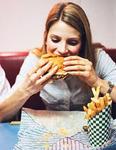| |
Restaurant Diners Using Small Forks Ate 56% More The amount we eat at restaurants can be affected by all sorts of factors -- the size and color of the plates, the shape of drinking glasses, the lighting, and even the background music. Now, intriguing new research suggests the size of your fork may influence how much you eat -- and strangely enough, it's bigger forks which might limit calories consumed! |
| University of Utah conducted a field study in a popular Italian restaurant, in which 98 university students of both genders were provided a pre-weighed plate of food of their choosing off the menu. Some students were given a large fork (which fully loaded held 20% more food by weight), while others were supplied a smaller fork. After they had "finished" eating, the plates were taken away to be weighed once more. The results: big fork diners left 179% more food on their plates! In other words, they ate 44% less weight than their small-fork counterparts. | |
More Articles...
- Love your Leeks
- Nuts for your nerves
- Chill Out, Burn More
- Zinc happy thoughts
- Junk Food Survey; Men vs Women
- Heartbreak causes lowered heartrate
- You'll go bananas for bananas after you read this!
- Finned food fortifies hearing
- Red's Attraction
- Can you think yourself thin?
- Surprise Salt Risk: Weaker Bones
- The most filling food for dieters
- Will you or Won't you? A study in Willpower
- Science confirms beer goggles effect
- Touch toes, help heart?
- Top 18 benefits of weight training
- Garlic and Cardiac Damage
- Think 'how' not 'why' when it comes to exercising more
- Taste Fat = Less Fat
- Peas help Pressure Drop!




